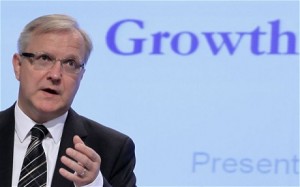The Commissioner: in the next 12 months “we’ll turn the corner” of the crisis, toward sustainable growth
Appeal for reform and change on “open-ended” contracts and “collective bargaining”
 Italy, during Berlusconi’s period in office, was a prime example of unreliability from which the EU must remain distant as this is the year in which “our credibility will be measured.” Olli Rehn, European Commissioner for Economic and Monetary Affairs, explained this to the European Parliament. “I can give you an obvious example. Think about Italy between August and November of 2011 –Rehn reminded – Italy had made some promises regarding fiscal consolidation in the summer, in part to facilitate the European Central Bank’s program to buy government bonds on the secondary market. Initially – he continued – Italy respected the promises, the ECB did intervene and for a brief lapse of time the borrowing costs improved. Then Berlusconi’s government decided not to respect the commitments and consequently there was an increase in refinancing costs for government bonds and a lack of loans that suffocated the economic growth and drove them into a dead-end street. This gave rise to the Monti government, which later was successful in stabilizing the situation. This – concluded Rehn – is a clear example of the effect upon trust.”
Italy, during Berlusconi’s period in office, was a prime example of unreliability from which the EU must remain distant as this is the year in which “our credibility will be measured.” Olli Rehn, European Commissioner for Economic and Monetary Affairs, explained this to the European Parliament. “I can give you an obvious example. Think about Italy between August and November of 2011 –Rehn reminded – Italy had made some promises regarding fiscal consolidation in the summer, in part to facilitate the European Central Bank’s program to buy government bonds on the secondary market. Initially – he continued – Italy respected the promises, the ECB did intervene and for a brief lapse of time the borrowing costs improved. Then Berlusconi’s government decided not to respect the commitments and consequently there was an increase in refinancing costs for government bonds and a lack of loans that suffocated the economic growth and drove them into a dead-end street. This gave rise to the Monti government, which later was successful in stabilizing the situation. This – concluded Rehn – is a clear example of the effect upon trust.”
2013 will be “a critical test for EU credibility,” and “if it goes well, it will be the year of recovery.” All the heads of the EU institutions continue to tell us this and they are so insistent that it may be necessary to believe it. Yesterday in Madrid it was the European Commissioner for Economic and Monetary Affairs, Olli Rehn, who reiterated the concept in a discussion held at the close of the meeting with the Spanish government, where he even spoke of “sustainable” growth. “This will be another difficult year – he admitted – but I am certain that it will also be the year in which we will turn the corner, where Spain and the Euro zone together can pass from stabilization to sustainable growth.” In advance, speaking to the European Parliament in the opening of the European semester (the period dedicated to checking and controlling the national budget), the Commissioner reminded that “last year there were serious concerns about Italy and Spain but now the situation has greatly improved, even if it is still not time to relax.”
For 2013 the Commission has 3 priorities, Rehn explained: “first to maintain a certain rhythm regarding economic reform to gain stability in the European economy. Second, we need to continue with the labor market reform and third we must follow with fiscal consolidation because excessive debts are an obstacle to growth.” Then we need, he urged, “stable and ambitious reforms in the labor market that remove employment obstacles,” where “open-ended contracts” and “collective bargaining” should be favored to reintegrate workers. Nevertheless, continues Rehn, in Europe and in the Euro zone “there are still serious problems like growth at slow rates and unemployment at high levels, and therefore, we cannot satisfy ourselves with what has been done” in the course of 2012. Thus, we need “to guarantee the citizens a platform for a stable economy,” but above all, “we need to reform and modernize the European model of social economy.” The crisis must not be an alibi to stop the process of political reform in the EU, and so we must insist on moving toward a political union of the EU. Not by chance, Rehn recalls, “we are discussing in depth the democratic scope of the EU and transformation of its institutes.”
At the end of the meeting in Spain, the Vice President of the Commission also said that “it is important to observe the positive developments that reflect faith in sustainable growth in Spain and the economic recovery that reflect the decisions made both by Spain and the Euro zone. The former obstacles to growth and competitiveness have been removed.” (N.B. in the press release on the meeting released today, the Commission does not specify that this occurred yesterday….)
R.G.
Licia Ronzulli, European Deputy of People of Freedom, replied to Rehn’s comments on Berlusconi’s government:
“Once more Commissioner Rehn confuses the European Parliament with a TV studio, using it as a milieu for a new and free attack on the actions of President Berlusconi’s government. The Commissioner forgets for the umpteenth time – in a long series of amnesia, his mandate requires a neutral approach toward all administration, avoiding any type of attack and personal critique toward European political leaders. The Berlusconi administration, as long as it was in power, always honored the commitments assumed with Europe. It makes it hard not to think that the Commissioner is not trying to influence the Italian constituency in light of the imminent elections, criticizing President Berlusconi and praising the conduct of his successor.”

![Un motoscafo in Svezia. Nell'Ue si pone un problema di mancato riconoscimento delle patenti nautiche [foto:
Matti Blume, Wikipedia Commons. Copyright: Creative Commons Attribution-Share Alike]](https://www.eunews.it/wp-content/uploads/2024/11/motoscafo-Saltsjoen_Stockholm_P1090679-350x250.jpg)







![Un motoscafo in Svezia. Nell'Ue si pone un problema di mancato riconoscimento delle patenti nautiche [foto:
Matti Blume, Wikipedia Commons. Copyright: Creative Commons Attribution-Share Alike]](https://www.eunews.it/wp-content/uploads/2024/11/motoscafo-Saltsjoen_Stockholm_P1090679-120x86.jpg)
